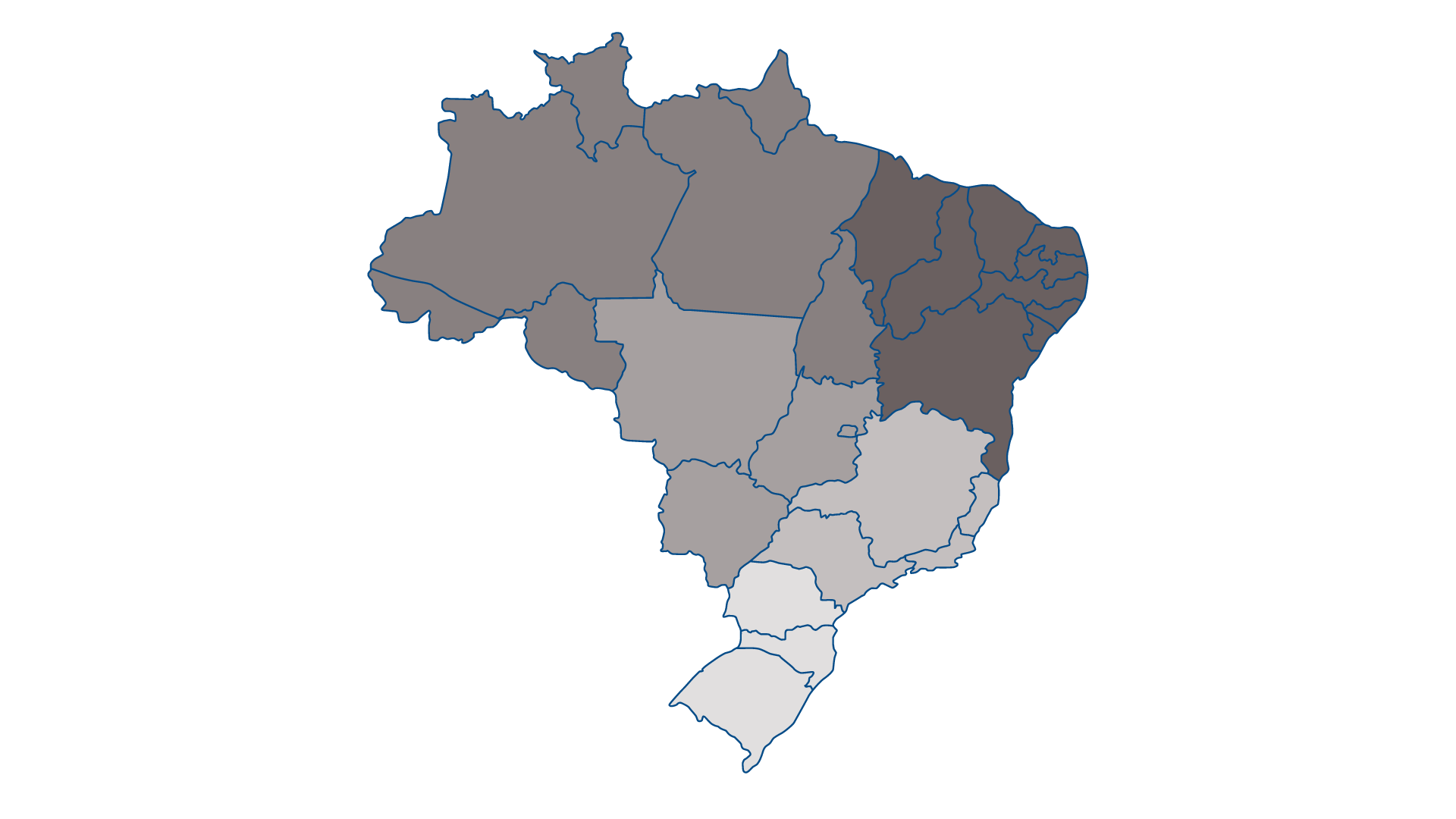Brazil is the largest country in South America and the region of Latin America, being the fifth largest in the world in territorial area (equivalent to 47.3% of South American territory) after Russia, Canada, China and the United States, and the third largest in America, with a total area of 8,515,767,049 square kilometers (km²), including 157 630 km² of water.
It is the sixth in population with more than 210 million inhabitants. It is the second economy in America (behind the United States only) and the eighth largest in the world. It is the only country in America where the majority of the population speak the Portuguese language and the largest Portuguese-speaking country on the planet, in addition to being one of the most multicultural and ethnically diverse nations, due to the strong immigration from different parts of the world.
Most Brazilians are descended from the country's indigenous peoples, Portuguese settlers, European immigrants and African slaves. The official language of Brazil is Portuguese, which is spoken by almost the entire population and is practically the only language used in the media, in business and for administrative purposes.
Brazil has a dense and complex system of rivers, one of the most extensive in the world, with eight large hydrographic basins, which drain into the Atlantic. The most important rivers are the Amazon (the largest river in the world both in length - 6 937.08 kilometers in length - and in terms of water volume - flow of 12.5 billion liters per minute), Paraná and its largest tributary, Iguaçu (which includes Iguaçu Falls), Negro, São Francisco, Xingu, Madeira and Tapajós. Bounded by the Atlantic Ocean to the east, Brazil has a coastline of 7 491 km. The country borders all other South American countries, except Chile and Ecuador.
Brazil is one of the main granaries on the planet, being the largest coffee producer of the last 150 years. It is classified as a medium-high income economy by the World Bank and a recently industrialized country, which holds the largest share of global wealth in Latin America. As a regional and medium power, the nation has international recognition and influence, and is also classified as an emerging global power and as a potential superpower by several analysts.
The largest urban agglomerations in Brazil are the cities of São Paulo (with 21 656 301 inhabitants), Rio de Janeiro (12 777 959), Belo Horizonte (5 178 131), Recife (4 056 323) and Brasília (4 012 896).
Its current Constitution, promulgated in 1988, conceives of Brazil as a presidential federal republic, formed by the union of the 26 states, the Federal District and the 5 570 Municipalities.
Already considered as the best tourist destination in the world in 2014, Brazil has among the most sought after destinations the Amazon Forest, beaches and dunes in the northeast, the wetland in the midwest, the Iguaçu Falls in Paraná, the beaches in Rio de Janeiro and Santa Catarina, cultural and historical tourism in Minas Gerais and business trips in São Paulo.
Brazil has a public health system, the Unified Health System (SUS), which is managed and provided by all levels of government, being the largest system of its kind in the world.
The Brazilian energy matrix is based on renewable sources, especially hydroelectric energy and ethanol, in addition to non-renewable sources such as oil and natural gas. Brazil has the second largest reserve of crude oil in South America and is one of the oil producers that has most increased its production in recent years. The country is one of the most important in the world in the production of hydropower.
With a road network of about 1.5 million kilometers, of which 212 798 km are paved highways (2010), roads are the main carriers of cargo and passengers in Brazilian traffic.
Brazilian music encompasses several regional styles influenced by African, European and Amerindian forms. It developed in different musical styles and genres, such as Brazilian popular music, nativist, country music, samba, choro, axé, brega, forró, frevo, baião, lambada, maracatu, tropicalismo, Brazilian rock and bossa nova, played and known worldwide for its beauty and grace in the voice of one of its creators, Tom Jobim.
Brazilian literature was formed from Modernism and its generations the first schools of truly independent writers. Great names like Manuel Bandeira, Carlos Drummond de Andrade, Guimarães Rosa, João Cabral de Melo Neto, Clarice Lispector and Cecília Meireles are from that literary era.
Brazilian national cuisine varies according to the region and is marked by the preservation of regional differences. Examples are Brazilian feijoada, considered the country's national dish; caipirinha made from cachaça, brigadeiro sweet and regional foods, such as beiju, tropeiro beans, vatapá, moqueca, polenta, cheese bread and acarajé.
Football is the most popular sport in Brazil. In motorsport, Brazilian drivers have won several Formula 1 world championships: Emerson Fittipaldi, in 1972 and 1974; Nelson Piquet in 1981, 1983 and 1987 and the legendary Ayrton Senna in 1988, 1990 and 1991.
Check out all our areas of expertise
- Medicines
- Health Products / Medicinal Devices
- Personal hygiene products, cosmetics and perfumes
- Sanitary and household cleaning products
- Food and food supplements
- Veterinary products







